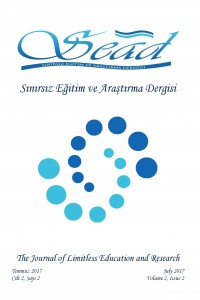Öz
Today, reading is the most important tool to guide the future. By
reading, language, mental and social skills are being developed, access, use
and produce new information is being easier. For this reason, reading
activities focused on, and it effort to carry out their conduct in accordance
with scientific methods. According to constructivist approach, the prior
students’ knowledge needs to be activated before new information can be
learned. Because new information is being studied, understood and structured in
the light of prior knowledge. Mental preparation is carried out for the healthy
execution of this process. Mental preparation ensures that the learners are
ready for the new subject by actively prior their knowledge. For this purpose,
various questions are asked before reading, studies are conducted such as reviewing
the text, predicting the content. Mental preparation provides improving
readers' attention, directing to aim and controlling the reading process the
reader. It ensures that the reading process is carried out consciously, planned
and controlled. For this reason, pre-reading mental preparation is emphasized.
For this reason, operations are performed such as activating preliminary
information, determining the purpose of reading, reviewing the text,
predicting, working with keywords, determining reading methods and techniques.
Through these processes, it is endeavored that students' reading, comprehension
and active learning skills are improved.
Anahtar Kelimeler
Kaynakça
- Adams, G., Davister, J., Denyer, M. (1998). Lisons futé. Stratégies de lecture, Bruxelles, Duculot.
- Crahay, M. (1999). Psychologie de l’éducation, Paris : Editions PUF.
- Giasson, J, Saint-Laurent, L. (2004).Facteurs de protection contre l’échec en lecture au premier cycle du primaire, Rapport synthèse. Action concertée du Fonds FCAR-CQRS-MCC-MEQ-MFE. Programme pour le soutien à la recherche en lecture, Université Laval
- Giasson, J. (1995). La lecture: De la théorie à la pratique, Éditeur Gaëtan Morin, Montréal.
- Giasson, J. (1996). La compréhension en lecture. Boucherville : Gaëtan Morin.
- Giasson, J. (1997). La lecture. De la théorie à la pratique. Bruxelles : De Boeck.
- Güneş, F. (2007).Türkçe Öğretimi ve Zihinsel Yapılandırma,Nobel Yayınları Ankara.
- Güneş, F.(2013). Türkçe Öğretimi Yaklaşımlar ve Modeller, Pegem A Yayınları
- Güneş, F. (2014).Sınıf Yönetimi,Yaklaşım ve Modeller,Pegem A Yayınları Ankara.
- Güneş, F. (2015).Etkinliklerle Hızlı Okuma ve Anlama,Pegem A Yayınları Ankara.
- Jay, B. (1996). Quelles pistes pour la formation du lecteur de textes littéraires au CM2 ? Une approche par la nouvelle MEMOIRE C.A.F.I.M.F
- Labédie, G. ve Amossé, G. (2001). Constructivisme ou socio-constructivisme?. Pädagogisches Institut der deutschen Sprachgruppe, Bozen DDEC de Nantes.
- Lachapelle, C. (2001). Les stratégies de compréhension en lecture, Ministère de l’Education de la Saskatchewan.
- MEB. Talim ve Terbiye Kurulu Başkanlığı (2005). İlköğretim Türkçe Dersi Öğretim Programı ve Kılavuzu, Ankara: MEB Basımevi.
- Saskatchewan. (2001). Philosophie et méthodes d'enseignement, Ministère de l'Éducation de la Saskatchewan
- Saskatchewan. (2000). Programme d'études, Ministère de l'Éducation de la Saskatchewan
- Vanderheyde, V. (1999). Les stratégies de lecture ou comment aider nos élèves à devenir des lecteurs efficaces, Courrier F, janvier.
Öz
Günümüzde okuma geleceğe
yön veren en önemli araçtır. Okuma ile dil, zihinsel ve sosyal beceriler geliştirilmekte,
bilgiye ulaşma, kullanma ve yeni bilgiler üretme daha kolay olmaktadır. Bu
nedenle okuma etkinliklerine ağırlık verilmekte, bunların bilimsel yöntemlere
uygun yürütülmesi için çalışılmaktadır. Yapılandırıcı yaklaşıma göre yeni bilgi
öğrenilmeden önce, öğrencilerin ön bilgilerinin harekete geçirilmesi
gerekmektedir. Çünkü yeni bilgiler, ön bilgilerin ışığında incelenmekte,
anlaşılmakta ve zihinde yapılandırılmaktadır. Bu sürecin sağlıklı yürütülmesi
için zihinsel hazırlık yapılmaktadır. Zihinsel hazırlık öğrencinin ön bilgilerini
harekete geçirerek yeni konuya hazır olmasını sağlamaktadır. Bu amaçla okuma öncesi
çeşitli sorular sorulmakta, metni gözden geçirme, içeriğini tahmin etme gibi
çalışmalar yapılmaktadır. Zihinsel hazırlık okuyucunun dikkatini artırmakta,
amaca yöneltmekte, okuma sürecini kontrol altına almasını sağlamaktadır. Okuma
sürecinin bilinçli, planlı ve kontrollü sürdürülmesini sağlamaktadır. Bu
nedenle okuma öncesi zihinsel hazırlık üzerinde önemle durulmaktadır. Bunun
için ön bilgileri harekete geçirme, okuma amacını belirleme, metni gözden
geçirme, tahmin etme, anahtar kelimelerle çalışma, okuma yöntem ve tekniklerini
belirleme işlemleri yapılmaktadır. Bu işlemlerle öğrencilerin okuma, anlama ve
aktif öğrenme becerileri geliştirilmeye çalışılmaktadır.
Anahtar Kelimeler
Kaynakça
- Adams, G., Davister, J., Denyer, M. (1998). Lisons futé. Stratégies de lecture, Bruxelles, Duculot.
- Crahay, M. (1999). Psychologie de l’éducation, Paris : Editions PUF.
- Giasson, J, Saint-Laurent, L. (2004).Facteurs de protection contre l’échec en lecture au premier cycle du primaire, Rapport synthèse. Action concertée du Fonds FCAR-CQRS-MCC-MEQ-MFE. Programme pour le soutien à la recherche en lecture, Université Laval
- Giasson, J. (1995). La lecture: De la théorie à la pratique, Éditeur Gaëtan Morin, Montréal.
- Giasson, J. (1996). La compréhension en lecture. Boucherville : Gaëtan Morin.
- Giasson, J. (1997). La lecture. De la théorie à la pratique. Bruxelles : De Boeck.
- Güneş, F. (2007).Türkçe Öğretimi ve Zihinsel Yapılandırma,Nobel Yayınları Ankara.
- Güneş, F.(2013). Türkçe Öğretimi Yaklaşımlar ve Modeller, Pegem A Yayınları
- Güneş, F. (2014).Sınıf Yönetimi,Yaklaşım ve Modeller,Pegem A Yayınları Ankara.
- Güneş, F. (2015).Etkinliklerle Hızlı Okuma ve Anlama,Pegem A Yayınları Ankara.
- Jay, B. (1996). Quelles pistes pour la formation du lecteur de textes littéraires au CM2 ? Une approche par la nouvelle MEMOIRE C.A.F.I.M.F
- Labédie, G. ve Amossé, G. (2001). Constructivisme ou socio-constructivisme?. Pädagogisches Institut der deutschen Sprachgruppe, Bozen DDEC de Nantes.
- Lachapelle, C. (2001). Les stratégies de compréhension en lecture, Ministère de l’Education de la Saskatchewan.
- MEB. Talim ve Terbiye Kurulu Başkanlığı (2005). İlköğretim Türkçe Dersi Öğretim Programı ve Kılavuzu, Ankara: MEB Basımevi.
- Saskatchewan. (2001). Philosophie et méthodes d'enseignement, Ministère de l'Éducation de la Saskatchewan
- Saskatchewan. (2000). Programme d'études, Ministère de l'Éducation de la Saskatchewan
- Vanderheyde, V. (1999). Les stratégies de lecture ou comment aider nos élèves à devenir des lecteurs efficaces, Courrier F, janvier.
Ayrıntılar
| Konular | Eğitim Üzerine Çalışmalar |
|---|---|
| Bölüm | Makaleler |
| Yazarlar | |
| Yayımlanma Tarihi | 15 Temmuz 2017 |
| Gönderilme Tarihi | 17 Mayıs 2017 |
| Kabul Tarihi | 5 Haziran 2017 |
| Yayımlandığı Sayı | Yıl 2017 Cilt: 2 Sayı: 2 |


